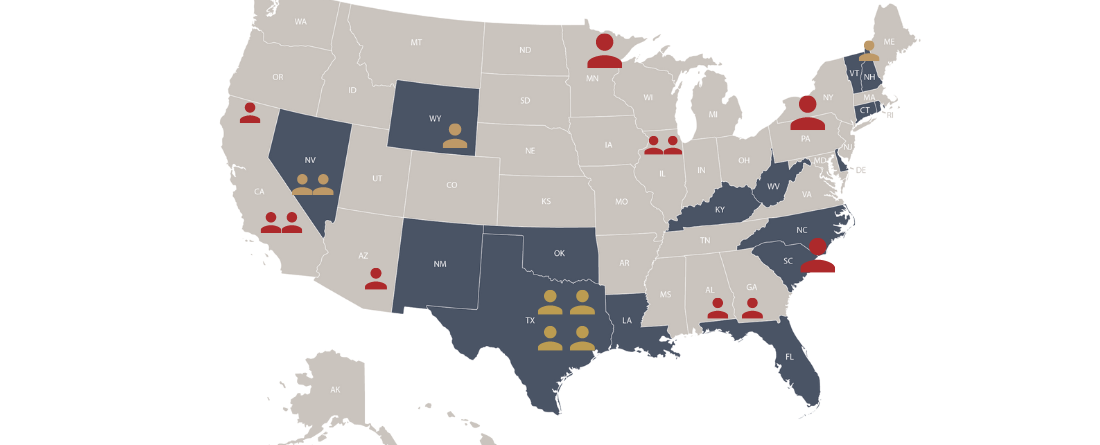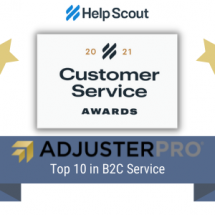During my work with our insurance carrier clients, I’ve often been asked “Which DHS License is best for my staff adjusters?” or “What DHS should my employees get?” It’s an interesting question…and one worth putting some thought into. But before we delve into which DHS is best, we need to start with the most important point about licensing.
If you (or your employee’s) state licenses adjusters, you need to get that home state license first. No if’s, and’s, or but’s.
Whether we are talking about an independent adjuster or a staff adjuster, the Designated Home State or ‘DHS’ license was created to provide individuals who are residents of non-licensing states, a means to designate a home state for the purposes of reciprocity and compliance. It should only be used for individuals who do not reside in a licensing state.
Most states will only grant a reciprocal license to an adjuster who is licensed in their home state, or one who designates a home state and holds that license. If you want more information about DHS licensing and why you need one, check out our article The DHS Adjuster License.
In this article, we’re focusing on what DHS license is best for company/staff adjusters. Let’s walk through a few factors that you need to consider when licensing staff adjusters.
Are your staff adjusters really staff adjusters?
As it usually goes in the insurance regulation world, what seems really simple at first glance gets a bit more complicated in the fine print.
Most people think of staff adjusters as those who work for an insurance company on a salary, and independent adjusters as those who work as independent contractors for different companies. That is often true, but not always.
Staff adjusters are salaried adjusters who work for insurance companies and adjust claims for policies written only by that same insurance company. For example, if you work as an adjuster for Allstate, handling only Allstate claims for Allstate policyholders, you are a staff adjuster as far as licensing is concerned.
Now let’s say you work for Gallagher Bassett as a salaried adjuster and you handle Allstate claims AND Gallagher Bassett claims. It would seem like you’re a staff adjuster because you are salaried and working for an insurer, right? Not so fast. The claims you are handling for your employer, in this case Gallagher, are actually for policies written by Allstate. In this situation, as far as licensing goes, you are considered an independent adjuster.
So, going forward, we will refer to “staff adjusters” as those who are salaried employees for a carrier handling claims solely for that carrier’s policies. Everyone else we’ll consider an “independent adjuster”.
At this point you might be thinking “Who cares? Staff adjusters and independent adjusters all get the same license.” Well, stick with us here because the answer is yes…and no.
Not all licensing states license staff adjusters
Some states that require independent adjusters to be licensed do not require staff adjusters to be licensed. However, every state that licenses staff adjusters also requires independent adjusters to be licensed.
The question then becomes, if your staff adjuster lives in a state that doesn’t license staff adjusters, but does license independent adjusters, which license should they get? A staff adjuster DHS or an independent resident license?
Unfortunately, there isn’t a single, simple answer here.
As far as the legal authority to handle claims goes, there is no difference between a staff and an independent adjuster license. However, some companies wish to keep a legal distinction, based on that adjuster’s relationship with the company.
Let’s look at some examples of the challenges. Say you live in Alabama which licenses independent adjusters, but not staff adjusters. Legally, a staff adjuster can get the Alabama license as a resident of that state and use Alabama’s reciprocity to get other licenses as well. Or a resident of the non-licensing state of Tennessee could choose Alabama as their independent DHS and use that to apply for other licenses.
However, if this adjuster is technically a staff adjuster, the company’s legal department may not want the adjuster to be licensed as an ‘independent.’ Remember, being an independent adjuster implies certain things about that adjuster’s relationship with the company.
Again, and I know it sounds odd, this will not affect that adjuster’s ability to legally work claims. But it could potentially affect other legal matters surrounding employment.
These are just a few of the complications that can arise when dealing with staff vs. independent licenses. Circumstances can vary by company and regulations definitely vary by state. We’ve worked with a lot of employers and have asked a lot of questions to state departments when it comes to these issues. While we can’t offer legal advice, we would be happy to walk through your situation and offer any information we’ve learned from experience.
Most of these licensing issues revolve around adjusters of all kinds wanting/needing reciprocal licenses in other states. Being able to obtain multiple licenses is vital for independent adjusters, staff adjusters, and the employers of both parties.
Independent adjusters can see where they can get reciprocal licenses in our interactive reciprocity map. If you’re a staff adjuster, far fewer states require you to be licensed. You can see a map of staff adjuster licensing states here.
As you can see, it’s important to determine what kind of adjuster you or your employees are so you don’t waste time or money getting unnecessary licenses.
What factors should I consider in choosing a DHS license?
Once you know what type of adjusters you employ, you will want to recommend a DHS to those who reside in non-licensing states. But which DHS license is best for staff adjusters?
Adjuster license reciprocity has made huge gains over the past 10 years and most licensing states are reciprocal with one another today. But there are some other important factors you should consider when choosing a DHS license for your team.
- Pick ONE home state license for everyone: To put it plainly, this just makes it easier for all involved. Say you handle claims across the country, but you have adjusters in 8 different non-licensing states. Picking one state means that your company will get used to the same pre-licensing and CE course material, the same exam, and the same application and renewal process. Picking different states all over the country leads to more confusion and more opportunity for error.
- If your adjusters handle claims in specific regions, pick a single state for each region. Again, this just helps the process stay consistent across the board.
- Choose the most comprehensive license: Even if you don’t think your adjusters will need an All Lines or General license, for reciprocity’s sake, it’s best for them to obtain the license with the most lines of authority. Reciprocal licenses are often granted on the basis of equality. And not every state offers the same license types so an adjuster’s best chance at getting the most reciprocal licenses lies in obtaining the most comprehensive license. Let’s look at a couple of examples.
- Texas offers a P&C Adjuster license but many other states, like Florida, do not. They only offer a General Lines or All Lines license. Since the P&C covers fewer lines, it is not reciprocal with the more all-encompassing licenses. In this case, a Texas P&C adjuster would be denied a reciprocal Florida license because there is no ‘only P&C’ equivalent in Florida.
- New York offers 10 (TEN!) types of adjuster licenses. Again, most states do not even come close. The best change for your NY adjuster to get reciprocal licenses is for them to obtain the General Lines license.
- Proximity to your home state doesn’t matter: Some people pick DHS licenses based on how close that state is to their resident, non-licensing state. While that is an option, it honestly offers NO benefits. Instead, choose the license that is the easiest to get and fits your needs. (More on that below.)
- Choose a license with great reciprocity: There is a myth that only Texas carries reciprocity with everyone. The truth is, today, most states have the same reciprocity (check out our map for your state’s reciprocity). There are some outliers like New York and California, but for the most part, licensing states in today’s claims industry are mostly reciprocal with one another.
- FYI: Arizona and Alaska do not recognize DHS licenses from any state. All DHS adjusters must pass their state exams to obtain those licenses.
- Choose a license with a fingerprint requirement: It may seem nice to skip this requirement upon initial licensing. You might think it’s saving time and money but it can hurt you in the long run. Lack of fingerprinting often results in your adjusters having to get fingerprinted multiple times down the road to obtain their other state licenses. If your DHS license has a fingerprint requirement, your adjusters won’t have to get them done again when applying for reciprocal licenses.
- Pick a license with a 24 hour CE requirement: We have a similar situation with CE requirements. While not having a CE requirement might sound like an advantage at first, it leads to future headaches for adjusters with multiple licenses. If your DHS license does not have a CE requirement, but you have 3 other licenses that do, you will have to choose one of those states to be your “DHS license for CE”. It’s not the end of the world, but it adds another layer in the process that you or your employees have to stay on top of.
- Same goes for DHS licenses with a 12 hour CE requirement. Your reciprocal licenses will require 24 hours of CE meaning you will have to take 12 hours of CE for your DHS and then an additional 12 hours in another state. Again, it’s not the end of the world, but it complicates matters, especially if you’re dealing with a lot of adjusters.
- Simplest is best: Some states make you do paper applications, have difficult exams, or require additional documents. Choosing a DHS state where the testing and licensing process is simple and straighforward will make things easier on both the manager and the employee. We recommend looking for a state that offers the following:
- Pre-licensing and exam are available online, such as our Florida course
- No additional fees for re-taking the exam
- Shorter exam
Have Questions about staff licensing?
Get in touch with our corporate team. We’d be happy to walk through your needs and help you determine which licenses are best for your adjusters.
So…what state has the best DHS license?
(Drum roll please…)
Honestly, there probably aren’t any surprises here. If you do the math on everything we mentioned above, Florida is the state that meets or exceeds all the criteria we’ve discussed.
Florida’s pre-licensing and exam can be done entirely online, without a proctor. They don’t charge for re-taking the exam. Their All-Lines license has great reciprocity and the exam is 50% shorter than some others. Florida meets all the CE and fingerprinting requirements as well. Perhaps most importantly to an employer, Florida is the quickest state in turning around applications.
Texas is another state we recommend although it does have some drawbacks. Texas offers online pre-licensing and exam, but the exam is significantly longer and requires a proctor. The state has made recent commitments to improve their processing time but again, there is just no beating Florida there.
Again, every situation and every employer is a bit different. Your company may have employees with special circumstances or claims with certain needs. There really isn’t a “one size fits all” solution here but, for our money, Florida comes close.
Whether it’s independent adjuster licensing, staff & company licensing, or claims regulations in general, things can get convoluted rather quickly. Our team works with corporate clients of all sizes, on licensing issues of all types, daily. If you have questions or concerns, give us a call. We’d be happy to help.



